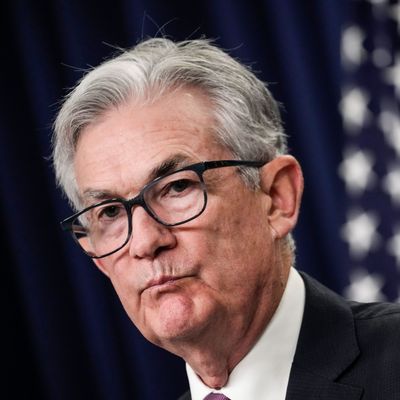
The economy doesn’t make a whole lot of sense, does it? For every good piece of data out there (unemployment near multigenerational lows, consumers increasing spending) there’s something else (inflation at multigenerational highs, consumers decreasing spending) to cancel it out. On Thursday morning, the federal government reported some more bad news: the economy contracted for the second quarter in a row. So does that mean we’re in a recession? Well, that’s complicated.
Depending on how you look at it, and politics has quite a lot to do with it, things are going fine or collapsing. But the economy is not a tart you buy from your local bakery; it can be good and you can hate it at the same time. To get a sense of how unwieldy it all is, look at the Federal Reserve. On Wednesday, the central bank’s administrators voted to hike interest rates by 0.75 percent for the second consecutive month, sucking out credit from the financial system at a rate unseen since the early 1980s. (To put into perspective how much of a jolt this is to the economy, the last time the Fed raised rates by this much, it took them more than two years to do it). Squeeze credit and the economy slows. Do it enough and you get a recession. It’s the kind of situation that’s rife with the same contradictions that make it so hard to get a handle on what can fix it: If the economy is doing so bad, why is the Fed taking the kind of actions that indicate it’s running hot?
So when Fed chair Jerome Powell answered questions at a press conference Wednesday, he did, at some minimum level, make things a little bit clearer for those who are confused by the state of the world. “I do not think the U.S. is currently in a recession,” he said. “And the reason is there’s just too many areas of the economy that are performing too well,” he added, referencing the labor market specifically: 2.7 million jobs were filled in the first half of the year, the unemployment rate has declined — things that you don’t normally see when there’s a recession. It’s an extraordinary statement from Powell considering that neither he nor anyone else has any say about whether the U.S. is officially in a recession. It’s unusual since the data around that question would get released the next day.
The question of whether the U.S. is currently in a recession has taken on greater urgency since the first quarter saw a decline in gross domestic product and the following three months were a period of rising inflation. Powell seemed to not take that much stock in the negative GDP print and noted that those numbers change all the time. And Claudia Sahm — who, as an economist at the Fed, came up with a widely followed recession indicator that looks at rising unemployment — wrote that the negative growth has a lot to do with retailers’ imports and the weird effects on the supply chain from the pandemic rather than anything to do with the health of the economy.
GDP fell by 0.9 percent in the second quarter, according to the Bureau of Economic Analysis. Colloquially, two-quarters of negative GDP growth has meant a recession, but that isn’t an ironclad rule. Since the pandemic, the rules around what to make of economic contractions has basically gone out the window. In 2020, the U.S. had a recession that lasted just a few months, something that nobody denies, even though it didn’t fall into the six-month timeframe. And this past quarter was made weird with all kinds of technical disruptions — like Joe Biden selling oil from strategic reserves, and large inventory overhangs from demand in the early part of the year — that don’t make this a clear picture.
With all that in mind, it’s too soon to say whether we’re in a recession or not. But the balance of the evidence seems to point to “probably not.”
Still, recessions are in a large part about perception. When the Fed decided to go hard last month and raise rates by three-quarters of a point, they did so in part because of a surprisingly gloomy consumer-sentiment survey. Republicans are already trying to get ahead of whatever comes out of the NBER tomorrow by saying that the media and the White House are putting their thumb on the scales by playing into the bad-vibes economy that people have been feeling for months. Even Conan O’Brien is getting in on it.
After Powell’s presser, the Dow Jones Industrial Average rose more than 400 points. Some, like hedge-fund billionaire Bill Ackman, had hoped that he would make a stronger statement about tamping down inflation, but if anything, Powell went in the opposite direction, saying that they wouldn’t give out as much information to the public as they have been as the central bank charts its next move. The Fed now takes a month off from its usual schedule and will likely make its next decision in September. Banks like Goldman Sachs think more large hikes are on the horizon, even if they’re not as large as the last two, before price increases start to come down. If Powell is right, the Fed might be able to keep a recession at bay — even if it’s just for a little bit longer.
This post was updated with the most recent economic data.






























